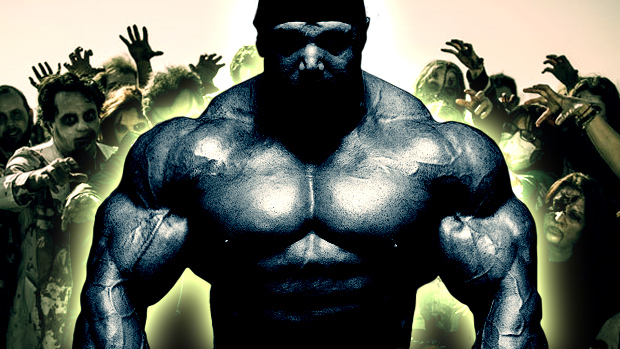New research published in the American Anthropologist reports the results of ethnographic research on a branded version of functional fitness. Brooklyn College anthropologist Katie Rose Hejtmanek suggests that the shift toward intensive, functional fitness programs exemplifies the American “audit culture” of the post 9/11 world and demonstrates the preoccupation with a coming apocalypse, termed ‘necropolitics,’ of elite, white Americans facing an uncertain, neoliberal future.
There is a growing body of evidence that exercise is an underappreciated response to major depression, first-episode psychosis, and attention deficits. Enthusiasts attest to its ‘life-saving’ qualities, which include a renewed sense of self-efficacy. Most of this research studies people whose mental health problems make it difficult to get any exercise at all, thus showing the massive benefit of small steps toward increasing bodily health and agility.
On the other end of the spectrum, toward excessive exercise, lies functional fitness. It is a type of exercise fad that emphasizes strict standardization and intensity. Psychologically, it represents uses of exercise described in eating disorder literature as asserting control over one’s body as a response to physical and emotional experiences that overwhelm one’s limited resources for coping.
This ethnographic research studies BranFunFit training centers and workout culture to highlight the ideology of disaster and wartime preparation (metaphorically referred to as the “zombie apocalypse”), motivating its white-collar adherents. The author links BranFunFit training, the zombie apocalypse, global transitions of power, and neoliberal shifts affecting hegemonic positions in the United States.

The intense audit system, culture, and subjectivity encouraged by BranFunFit training squares with fears about a pending apocalypse for which the daily workouts prepare participants. She claims that such participation expresses racial and class-based tensions exacerbated by neoliberal precarity in the United States.
Zombies and the apocalypse have historical roots in US society, leading to zombie apocalypse fears in post-9/11 America. Per the American cultural tropes of self-realization, one’s survival depends on one’s own resources and limits and relies on personal preparedness, to which BranFunFit provides an answer.
The author links this gym brand’s emergence to a historical summons to fitness by US presidents, drawing in those who are supposed to represent the United States – fit, white males. An ex-US combat trainer created the regimen shortly after 9/11. Though there are gyms all over the world, the community of BranFunFit practitioners in the US is economically elite (six-figure incomes), educated (40% with postgraduate degrees), and white (86%).
In audit culture, discipline is cultivated through standards, and the body is trained through competitive classes, coaches, logging, and group documentation of workouts. Daily workouts named after war veterans and natural disasters illustrate how BranFunFit is a performance measurement system replete with a complex knowledge base of techniques.
“One assesses fitness levels—one’s physical capacity, what the body can endure—based on the ability to intensely perform workouts linked to war, death, and natural disaster,” Hejtmanek explains. “What one eats, how one counts food, how much one sleeps, how much water one drinks, what supplements one ingests, one’s body weight, one’s perceived daily stress levels, and one’s personal records are all measured, documented, and come to define not only one’s daily exercise routine but also how hard and smart one is training and how fit one’s body is.”
According to the author, these activities are meant to mediate insecurity and risk of pending worlds in which global power and dominance have shifted.
“BranFunFit’s efforts to train to survive such a world is a moral framework that doubles down on capitalist agendas, individual and hegemonic masculine work, and postcolonial racial hierarchies rather than turning toward social organizing or a commitment to others more broadly.”
While survivalist or millenarian ideologies are commonly known to be religiously motivated or simply paranoid, this framework of zombie apocalypse survival via BranFunFit is “located within a secular community that represents America’s elite citizenry.” The focus on standards or “audit systems,” disciplinary technologies focused on instilling new norms of conduct, is cross-cultural. The zombie apocalypse survival framework, however, is unique to America.
The survivalist framework bespeaks a calculus of life that perceives another’s existence as an attempt on one’s own life–a distinctively wartime sentiment. Those who benefit from racism, patriarchy, and capitalism understand the upending of these systemic injustices and the “Others,” the “living dead” at their doors, as threats to their lives. The comfort of an individual and group survival of the fittest, in this case, proves more bearable than facing the psychic burden of race-based stress and other burdens of impending social transformation.
BranFunFit is a fitness practice organized as an audit system, encouraging participants to govern themselves and others according to rigorous standards. Rigorous training answers to a pending world where a racialized Other is responsible for upending the current world order. Forging a practice of life through fear of death constitutes an elite response to a world and psyche shot through with terror, economic precarity, and border and cyber insecurity.
****
Hejtmanek, K. R. (2020). Fitness Fanatics: Exercise as Answer to Pending Zombie Apocalypse in Contemporary America. American Anthropologist, 122(4), 864–875. https://doi.org/10.1111/aman.13462 (Link)















It sounds like they want to have their cake and eat it!
Report comment
“While survivalist or millenarian ideologies are commonly known to be religiously motivated or simply paranoid, ….” This is one of the main problems with the “mental health” industry. Too many “mental health” workers tend to equate belief in God and the Holy Bible, with paranoia.
And I know of a LOT of people who’ve had spiritual experiences misdiagnosed by “mental health” workers, as the “invalid” DSM disorders. Despite such crimes being illegal in the USA, a country with supposed “freedom of religion.”
“Those who benefit from racism, patriarchy, and capitalism understand the upending of these systemic injustices and the ‘Others,’ the ‘living dead’ at their doors, as threats to their lives.” Really? “Mental health” workers call the ethical, fiscally responsible, women of the non-bailout needing, American banking families, the “living dead?”
But I will say that’s quite an accurate description of the theology of a white male psychologist, artist, and likely bailout needing banker’s son, who was recently sicked upon me, by a white male ELCA pastor, to whom I’d given a copy of “Anatomy of an Epidemic.”
This attack came right after I had a show of my artwork, much of which is of an eschatological nature, quite similar to many great artists of old, particularly Chagall’s. That psychologist/artist knew enough about art, that he saw me as a “Chicago Chagall,” since I am a Chagall fan. So that psychologist wanted to steal all my work and my family’s money, according to the “art manager” contract he gave me. Of course I said, no thank you, as politely as I could.
I had given that pastor “Anatomy” because I was hoping that my childhood church would want to see all the harm being done to American children, by the “mental health” workers, end.
Instead, I was told, and shown, that the ELCA religion – and likely many other religions – and the “mental health” workers, were inextricably linked, via a systemic medical/religious “conspiracy.”
I’m very saddened to now know with 100% certainty, that my childhood religion is a psychologist trusting, DSM “bible” thumping religion. Rather than a God trusting, Holy Bible believing religion.
And I hope the US “mental health” industry thinks twice about the “dirty little secret of the two original educated professions,” systemic child abuse covering up crimes for the mainstream, formerly Christian religions.
And realize that systemic pedophile aiding, abetting, and empowering – for those religions – is destroying America, from within, and the world. Especially, since we all now live in a “pedophile empire.”
https://www.amazon.com/Pedophilia-Empire-Chapter-Introduction-Disorder-ebook/dp/B0773QHGPT
By the way, I found refusing to stop religiously exercising, while I was being attacked by satanic child abuse covering up “mental health” workers, to be wise behavior. I’m quite certain regularly exercising is part of what helped me survive and escape the insane psychological and psychiatric attacks.
Report comment
For me the telling thing about this work is that these are elite white males indulging is this form of “preparedness.”
These guys don’t know what’s actually going to happen on this planet, but this gives you some idea what people in this echelon of society are being told is going to happen on this planet. In a couple words, they appear to be scared shitless. And that’s just where their overlords want them.
This is the “warrior” solution to a bad future scenario. It is very materialistic. You dig in, you tough it out, and you literally fight to defend your position. In the past this has to some degree worked. After all, we ARE living in a material world. If you can come out on top materially, you might survive. This is the “religion” of an entire culture. It is associated with Western White Males, but others have been drawn into it. There is a certain logic to it. It is implicit in our modern hero stories, even in our stories of female heroes.
It, of course, leaves out the Spiritual (except in a kind of offhand way), the other important aspect of life. So we are left with an elite of spiritual cripples who can see no alternative BUT to dig in and fight if things get bad. No other more creative alternatives offered or entertained. Yet that is where our survival lies. If we can come up with some creative alternatives that combine obvious spiritual facts of life with obvious material facts of life, we might have a small chance of making it through all this with an intact planet and a reasonably free population living on it.
Report comment
Everybody faces their own apocalypse, eventually. It’s when we die. So, how have we lived? Have we lived only for ourselves, or for others too? Or worse, have we lived for ourselves by destroying others, like the average psychiatrist.
Report comment